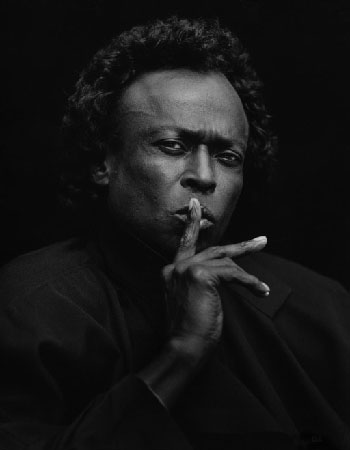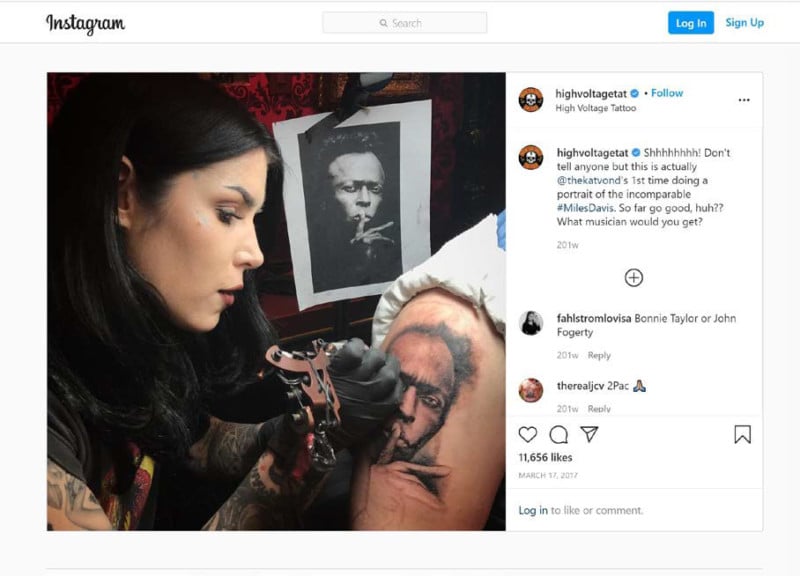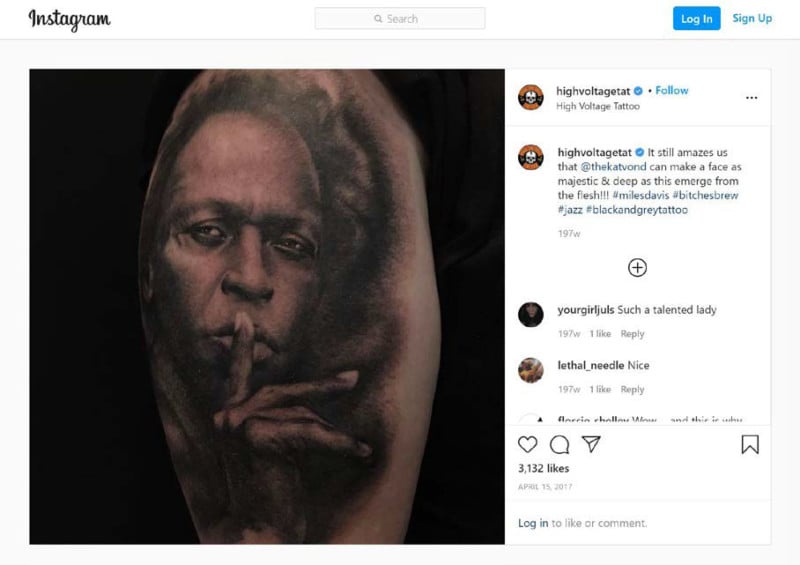Photographer and Kat Von D Go on Trial in Case That May Upend Tattoo Industry
![]()
Celebrity tattoo artist Kat Von D went on trial over a photographer’s claims that an image of a Miles Davis tattoo she inked on a client infringed his copyright — in a case that may upend the entire industry.
On Tuesday, Von D appeared in a Los Angeles federal courtroom against photographer Jeff Sedlik, who has filed a lawsuit accusing her of infringing on his copyright by using his iconic 1989 photo of Davis for a tattoo on her friend Blake Farmer — that she inked free-of-charge for him.



Los Angeles-based photographer Sedlik has been granted a jury trial against Von D following the U.S. Supreme Court’s recent ruling on The Andy Warhol Foundation v. Lynn Goldsmith case.
In May last year, America’s highest court held that Warhol’s portraits of music icon Prince was not fair use of Goldsmith’s copyrighted photo, and ruled that Warhol’s work shared the same commercial purpose as the original image photo of Prince.
Sedlik’s case is believed to be the first ever to consider whether copyright protections for images apply to tattoos.
‘Nobody’s Ever Complained Before’
Sedlik’s lawsuit challenges widespread tattoo creation practices, whereby tattoo artists rarely ever purchase a license for a photograph to base an inking on. The trial could have wide-ranging implications for the tattoo industry.
According to Bloomberg Law, Von D’s lawyer told a jury that she had never purchased a license for any of her inkings as “nobody’s ever complained” about these tattoo industry norms — and she knows of no tattoo artist who does.
According to Rolling Stone, Von D’s lawyer added that she had only used Sedlik’s famed photo for “inspiration” and that it was “transformative” enough to not count as an exact replication.
“You will see that there are many differences,” Von D’s lawyer Allen B. Grodsky told jurors on Tuesday.
Grodsky pointed to “differences in the position and shape of shadows, difference in the use of light, difference in the hairstyle, differences in the shape and rendering of the eyes.” He also said that Von D’s tattoo had no jacket and no black background like Sedlik’s original photograph.
“Kat Von D’s interpretation of Miles Davis had a sentiment that was more melancholy than Mr. Sedlik’s,” her attorney claims.
“And you’ll see that it has movement that’s not found in his. Kat Von D did not attempt to monetize the tattoo in any way.
“She did not make photos of prints that she sold. She didn’t sell tee shirts or mugs. She didn’t sell products in any way.”
A Photographer Relies on Licensing Fees
However, Sedlik’s attorney argued that the photographer’s copyright still stands, even for a free tattoo. This is especially because, while Von D may not have directly monetized the tattoo, she indirectly likely profited from the social media posts she made featuring the tattoo while promoting her brand on Instagram, Facebook, and YouTube.
The photographer’s attorney also challenged the current industry norms whereby tattoo artists do not license an image for an inking.
“Don’t be fooled by the, well, everyone else is doing it, so it’s okay [argument],” Sedlik’s attorney Robert Allen told the jury in his opening statement
During questioning at the trial, Sedlik said that he relies on licensing fees to support himself and his family.
“I support my family by licensing my images. Please respect the rights of all artists,” the photographer’s Instagram bio reads.
Bloomberg Law reports that Sedlik’s attorneys showed examples of photographs that he has licensed to artists in the past for them to adapt and sell, according to parameters the photographer and other artists negotiate. In one case where a painter adapted the Miles Davis portrait into a more colorful image, Sedlik expects to make up to $85,000.
The seminal trial is expected to run between six and seven days, with Von D expected to testify today.
Jurors will be tasked with deciding whether Von D made “commercial” use of Sedlik’s image and whether her use of the image hurt Sedlik’s ability to license the image himself, a key question in any fair use case.
Image credits: All photos via court documents.